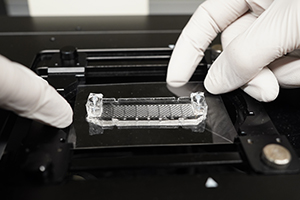Liquid Biopsy 3: Magnetic Ranking Cytometry (MagRC)

Principal Investigator: Shana Kelley, Ph.D.
Organization: University of Toronto
Years of Grants: 2005-2019 (R21 and R33 award)
“Magnetic ranking cytometry allows the quantitative analysis of molecular markers in single circulating tumor cells. This is a powerful capability for liquid biopsy that will allow therapeutic targets to be tracked for treatment selection.”
What is it?
- Magnetic Ranking Cytometry (MagRC) purifies circulating tumor cells (CTCs) from whole blood samples by selectively marking the CTCs with magnetic particles and then isolating the cells using a magnetic microfluidic device.
How does the technology intend to change cancer research and patient care?
- The MagRC device extracts tumor cells from blood samples with high sensitivity and specificity. In addition to assessing whether the CTCs contain a cancer-specific biomarker, these cells can undergo multiple downstream tests to provide a better understanding of the primary tumor.
- A unique feature of the device is to classify cells as they are captured based on the level of the biomarker each cell contains. The distribution of expression levels across tumor cells reveals heterogeneity (or variety) within the sample, which can be an indicator of how likely the cancer is to be metastatic.
How is this important for the patient?
- The MagRC device enables real-time monitoring of CTCs which can be used to monitor disease progression and predict therapeutic responses.
- The application of this technique has been demonstrated in the lab using mouse models for prostate cancer and with patient blood samples and is currently being adapted for lung cancer, breast cancer, and renal cancer.

Example(s) of success:
- In collaboration with a program at the NCI, this group has gathered data from clinicians about how the device would be most useful in practice and what the clinicians would need to implement device, leading the team to focus on predicting therapeutic responses in lung cancer. By matching patients with a particular therapy, they hope to improve patient care by limiting side effects and adverse events.
- They have closed a seed round of funding and are launching a start-up company (Cellular Analytics) in Toronto to commercialize the device.
To learn more about this technology, check out the Kelley Lab website or visit the Cellular Analytics website.

